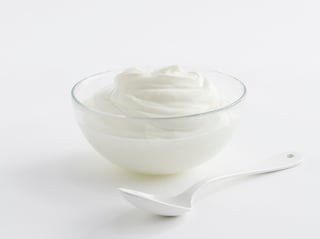-
Why Mainstream Consumers Want Probiotics
By Terri Rexroat December 28, 2016- Tweet
 Digestive health and its relation to the immune system is a growing area of focus for consumers, leading into the new year. We’ve already seen a rise in everyday foods and beverages that contain added probiotics, but why? These products tout improved digestive health and a stronger immune system, and we expect the appetite for these benefits to rise in 2017. Fortunately, consumers’ favorite dairy offerings help incorporate probiotics into more products.
Digestive health and its relation to the immune system is a growing area of focus for consumers, leading into the new year. We’ve already seen a rise in everyday foods and beverages that contain added probiotics, but why? These products tout improved digestive health and a stronger immune system, and we expect the appetite for these benefits to rise in 2017. Fortunately, consumers’ favorite dairy offerings help incorporate probiotics into more products. Mostly known for gut health, probiotics are gaining attention for additional benefits, such as their potential impact on the immune system. Probiotic research is ever-evolving with the full range of health benefits still being explored, but these beneficial living microorganisms are popularly believed to physically displace harmful, disease-causing microbes, therefore strengthening the immune system.
How does this relate to digestive health? The normal microbiological flora of the human gut is compromised by many factors of daily life such as stress, medications, and inadequate diet and/or sleep, thus hindering the immune system. Daily consumption of probiotics can help limit the effects of these circumstances by decreasing gut discomfort and increasing the strength of the immune system.
For years, probiotics have appeared in dairy applications like yogurt, kefir, fluid milk, ice cream and smoothies. Advances in probiotic technology also are allowing their incorporation into shelf-stable foods including chocolate, granola bars, juices, nut butters and cookies. And now, consumers want more of the foods and beverages they consume throughout the day to have the benefits of probiotics.
However, probiotics require expert handling to maintain their viability in the finished product. Since some foods are better probiotic vehicles than others, background information is required. Dairy foods, especially fermented dairy foods, are the ideal probiotic vehicles for several reasons, including:
- Probiotics are compatible with the bacteria that drive fermentation, so they’re easily incorporated into starter cultures.
- Ease of probiotic incorporation into aqueous, water-based dairy systems promotes maximum probiotic survival.
- Refrigerated storage of fermented dairy products helps prolong probiotic viability over shelf life, thereby insuring ingestion of sufficient numbers to help support digestive health.
- Because dairy products are typically consumed on a daily basis, this complements the “daily dose” aspect required to maximize probiotic efficacy.
Consuming live probiotics as integral components of clean label whole foods brings added nutrition and enjoyment that can’t be achieved by taking probiotic-containing dietary supplements. Meaning, dairy foods are a good fit for manufacturers interested in introducing more probiotic-containing products to market.
Help consumers feel better in 2017 by exploring ways probiotics can be added to your array of product lines. Visit ThinkUSAdairy.org for more information.
Most Popular Posts
Find by Date, Geography and Dairy Product
- September 2015 (6)
- December 2015 (5)
- September 2016 (5)
- December 2016 (5)
- June 2017 (5)
- February 2015 (4)
- March 2015 (4)
- April 2015 (4)
- May 2015 (4)
- June 2015 (4)
- July 2015 (4)
- November 2015 (4)
- January 2016 (4)
- March 2016 (4)
- June 2016 (4)
- August 2016 (4)
- October 2016 (4)
- November 2016 (4)
- February 2017 (4)
- March 2017 (4)
- April 2017 (4)
- November 2013 (3)
- October 2015 (3)
- February 2016 (3)
- April 2016 (3)
- May 2016 (3)
- July 2016 (3)
- January 2017 (3)
- May 2017 (3)
- July 2017 (3)
- August 2017 (3)
- September 2017 (3)
- October 2014 (2)
- August 2015 (2)
- October 2017 (2)
- December 2017 (2)
- July 2020 (2)
- December 2013 (1)
- February 2014 (1)
- June 2014 (1)
- August 2014 (1)
- September 2014 (1)
- November 2014 (1)
- November 2017 (1)
- January 2018 (1)
- February 2018 (1)
- May 2018 (1)
- June 2018 (1)
- July 2018 (1)
- August 2018 (1)
- September 2018 (1)
- October 2018 (1)
- November 2018 (1)
- February 2019 (1)
- March 2019 (1)
- April 2019 (1)
- July 2019 (1)
- October 2019 (1)
- March 2020 (1)
- April 2020 (1)
- June 2020 (1)
- October 2020 (1)
- November 2020 (1)
- March 2021 (1)
- April 2021 (1)
- June 2021 (1)
- August 2021 (1)
- February 2022 (1)
- June 2022 (1)
- September 2022 (1)
- October 2022 (1)
- November 2022 (1)
- February 2023 (1)
- April 2023 (1)
- USDEC Staff (65)
- Kara McDonald (24)
- Terri Rexroat (15)
- John Klees (15)
- Kristi Saitama (9)
- Angelique Hollister (8)
- Vikki Nicholson-West (8)
- Shannon Koski (8)
- Rohit Kapoor (3)
- Keith Meyer (2)
- Moises Torres-Gonzalez (2)
- Amy Foor (2)
- Alan Levitt (1)
- Tom Vilsack, President and CEO (1)
- Allison Guzman (1)
- Dacia Whitsett-Morrow (1)
- Ryan Hopkin (1)
- Matthew Pikosky (1)
- Ross Christieson (1)
- Nina Halal (1)
- Mary Wilcox (1)
Keywords
- 2018 beverage trends (3)
- 2018 Food Innovations (1)
- 2018 food trends (3)
- Asia (1)
- Avian Influenza (1)
- Award-winning cheeses (3)
- Awards (2)
- Back-to-School (1)
- Baked Goods (1)
- Bakery (1)
- Beer (2)
- Beverage (5)
- Breakfast (1)
- Butter (6)
- Casein (2)
- Cheese (48)
- cheese flavors (2)
- Cheese Pairing (3)
- Cheesemaking (5)
- Child Nutrition (3)
- China (6)
- Clean Label (6)
- Common Food Names (1)
- Consistent Supply (3)
- Consumer Insights (48)
- Consumer Promotional Tools (1)
- Consumer Trends (15)
- Contest (1)
- craft foods (2)
- Cultured dairy (1)
- Dairy (17)
- Dairy Detective (4)
- Dairy Fat (1)
- Dairy Futures and Options (3)
- Dairy Ingredients (82)
- Dairy Ingredients Symposium (1)
- Dairy Permeate (1)
- Dairy Product Solids (1)
- Dairy Production (5)
- Dairy Proteins (35)
- Dairy Resources (23)
- Dairy Trade (1)
- Dairy Trends (10)
- Dessert (1)
- Digestive Health (2)
- Donna Berry (1)
- Drinkable yogurt (1)
- Early Childhood Development (1)
- Educational Tools (1)
- Egg Replacement (2)
- Egg Substitution (1)
- Egypt (1)
- Energy (4)
- Environment (2)
- Europe (1)
- Export Data (8)
- Exports (7)
- Farming (1)
- Flavor Trends (1)
- Follow-on Formula (1)
- Food Aid (2)
- Food and Beverage Trends (7)
- Food Production (3)
- Food Technology (3)
- Foodservice (2)
- Free From Claims (1)
- Full-fat Dairy (1)
- Geographical Indications (GIs) (1)
- GHG (1)
- Global (74)
- Global Dairy Market (2)
- Global Demand (2)
- Global Market (4)
- Global Supply (1)
- Greek Yogurt (1)
- Gulfood (2)
- Gut Health (1)
- Health (1)
- Healthy Aging (8)
- Healthy Indulgence (1)
- Heavy Cream (1)
- High Quality Protein (11)
- Holiday Dessert (2)
- Holidays (1)
- IFT (7)
- IFT2016 (1)
- IFT2018 (2)
- Infant Formula (1)
- Infographic (3)
- Innova Market Insights (4)
- Innovation (2)
- Japan (7)
- Lactose (8)
- Lactose-free (1)
- LinkedIn (1)
- Malnutrition (2)
- Market Insights (67)
- Methane (1)
- Mexico (2)
- Micellar Casein (3)
- Middle East (2)
- Middle East/North Africa (9)
- Milk (8)
- Milk Permeate (2)
- Milk Powder (10)
- Milk Protein (19)
- Milkfat (5)
- Millennials (3)
- MPC (4)
- MPI (1)
- Muscle Maintenance (1)
- Muscle Recovery (2)
- Muscle Synthesis (2)
- NAFTA (1)
- New Product Introductions (1)
- New Year's Resolutions (1)
- Nonfat Dry Milk/Skim Milk Powder (4)
- Nutrition (21)
- Nutrition Research (14)
- Obesity (1)
- Overnutrition (1)
- Permeate (19)
- Price Volatility (2)
- Probiotics (2)
- Product Innovation (3)
- Protein (33)
- Prototypes (1)
- Record (3)
- Reduced-Fat (1)
- Research & Data (1)
- Resources and Tools (8)
- Risk Management (3)
- RTD Coffee and Tea (1)
- Salon Culinaire (1)
- Salt Substitute (1)
- Savory Flavors (1)
- Science and Research (3)
- Service Providers (1)
- Simple Ingredients (1)
- Singapore (1)
- Skimmed Milk Powder (2)
- Smoothies (1)
- Snack Trends (3)
- Snacking (4)
- Snacks (1)
- Sodium (3)
- Sodium Reduction (4)
- South Korea (3)
- Southeast Asia (9)
- Sports Nutrition (4)
- Stewardship (1)
- Student Competition (1)
- Supplier Directory (1)
- Supply (4)
- Sustainability (7)
- Sustainability Awards (1)
- Sustainable Nutrition (7)
- Technology (1)
- ThinkUSAdairy (2)
- Toddler Formula (1)
- Trade Data (1)
- U.S. Dairy Industry (11)
- U.S. Dairy Industry Growth (6)
- U.S. Dairy Partnerships (4)
- U.S. Dairy Products (15)
- UK (1)
- United Arab Emirates (5)
- United States (10)
- USDEC Events (44)
- Value (3)
- Vietnam (5)
- Volatility (1)
- Volume (4)
- Waste Reduction (1)
- Weight Management (6)
- Whey (14)
- Whey Ingredients (3)
- Whey Permeate (5)
- Whey Products (3)
- Whey Protein (47)
- Whey Protein Concentrate (3)
- Whey Protein Isolate (5)
- Whole-milk dairy (1)
- Wine (2)
- World Championship Cheese Contest (1)
- World Cheese Awards (2)
- World Milk Day (1)
- WPC (4)
- WPI (1)
- Yogurt (6)


